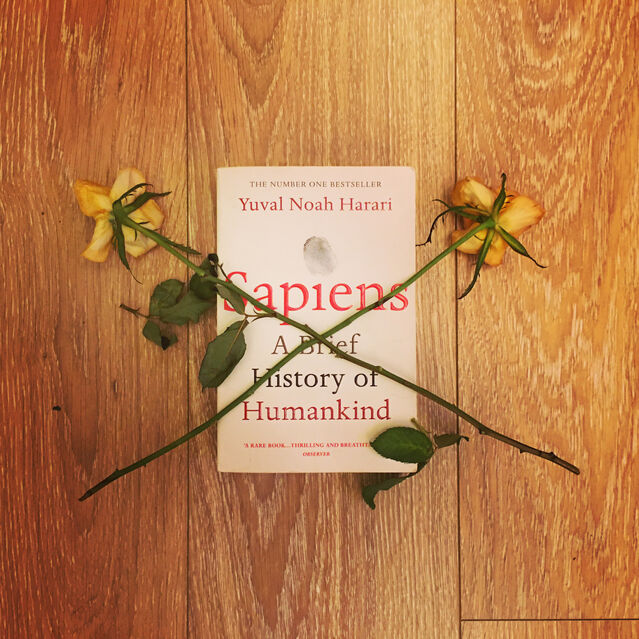Relationships
In Harari's Sapiens, Meaning of Life Is Just a Delusion
How he gets meaning wrong—and how to find meaning beyond scientific nihilism.
Posted November 20, 2020
The tremendous popularity of Yuval Noah Harari’s breakthrough book, Sapiens, left many wondering when did history become so popular. The answer, of course, is that the book was not really about history but about today, about a rupture in worldview we are facing right now – as Harari’s subsequent works, Homo Deus and 21 Lessons for the 21th Century, made clear.
What Harari offers us is best summarized in his own words:
”A more general look at life in an age of bewilderment, when the old stories have collapsed, and no new story has emerged so far to replace them.”
What Harari is arguing is that humans have always constructed various myths and stories to explain how the world works and what gives meaning to our lives. He goes through the old stories, including Christianity and other religions, arguing that they are ultimately just stories created by humans that mix together wishful thinking, psychological tricks, and tales designed to appeal to human pride. ”Collective delusions about the afterlife” might have made our ancestors happier, but Harari argues that, ultimately, all these stories are wrong: We should expect ”nothing but complete and meaningless oblivion.”
In the footsteps of Daniel Dennett, Richard Dawkins, Sam Harris, and other articulators of a post-Darwinian, scientific worldview, Harari argues that the story of human life is that there is no story, and we simply must accept the bleak vision of human existence offered by science:
”In itself, the universe is only a meaningless hodge-podge of atoms. Nothing is beautiful, sacred, or sexy – but human feelings make it so. … Take away human feelings, and you are left with a bunch of molecules.”
Given that we humans are simply a bunch of molecules accidentally conglomerated together by the blind algorithms of evolution, ”our actions are not part of some divine cosmic plan” and there is no meaning whatsoever to human life:
”Any meaning that people ascribe to their lives is just a delusion.”
What sets Harari apart from many previous horsemen of disenchantment is that he condemns not only the other-worldly meanings offered by religions but sees that people finding meaning in capitalism, nationalism, liberalism, or even humanism are equally deluded. These modern ways to make sense and imbue our lives with meaning are to him just religious delusions in a new package. Human rights, the good of the nation, free will – these all exist ”only in the imaginary stories we humans have invented” and drawing meaning from them is at best a comfortable delusion, at worst a justification for atrocities.
I, for one, enjoy the challenge offered by Harari. It is refreshing to question one’s deepest beliefs and values from time to time, and Harari’s matter-of-fact style of doing so is appealing.
The trouble starts when one investigates what Harari offers in place of the old stories.
Harari’s answer starts with denouncing us having any permanent selfhood. ”The free individual is just a fictional tale concocted by an assembly of biochemical algorithms.” The biochemical processes in our brains might create various momentary experiences but these flashes of experience do not add up to any enduring essence. Us having "a self" is another imaginary story and only by breaking away from that illusion can we be liberated to see the world as it is:
”The universe has no meaning, and human feelings too are not part of a great cosmic tale. They are ephemeral vibrations, appearing and disappearing for no particular purpose. That’s the truth. Get over it.”
In essence, Harari is advocating a kind of Buddhist vision of life where the goal is to become liberated from suffering by ceasing to be attached to our feelings. For him, ”the most real thing in the world is suffering.” Morality is not about ”following divine commands” but ”reducing suffering.” Why should I care about the suffering of others? Because hurting others hurts you too. ”Every violent act in the world begins with a violent desire in somebody’s mind, which disturbs that person’s own peace and happiness before it disturbs the peace and happiness of anyone else.” The suffering of others is thus only relevant to you because it might increase your own suffering. How to be moral? Develop a deep appreciation of suffering through practicing meditation. That is Harari’s recipe:
”Life has no meaning, and people don’t need to create any meaning. They just need to realize that there is no meaning, and thus be liberated from the suffering caused by our attachments and our identification with empty phenomena.”
As a worldview, this is blatantly inadequate. It fails to give us anything positive to do in life. There is nothing grand to aim at, nothing to hope for, nothing bold to strive for, nothing to accomplish. Just a negative command: Don’t make others suffer. And learning to be detached from one’s own suffering. When people ask ”What should I do?” Harari offers them Buddha’s advice: ”Do nothing. Absolutely nothing.”
Meditating two hours each day, as Harari states he is doing, is fine. It might help one to cease being entangled in the hopes and wishes that make one suffer. But when one is relieved from suffering, one still has a life to live. One still has choices to make, and one still wants to fill one’s days with activities that are meaningful. For that, Harari doesn’t offer any answer whatsoever.
The inadequacy of Harari’s answer to meaning in life is best shown by examining his own life. He has written books where he tries to tackle the grand challenges of our age, devoting his career to offering humanity better answers and new hope to these questions. His books have touched the minds of millions of people around the world, offering new clarity and hope for a better future. Sounds to me that Harari has found a very meaningful way to live his life. But according to his own theory, ascribing any meaning to this is delusional. The only thing real is one’s own suffering and the only valid motive is to become detached from that suffering. Other grand goals and values are just delusions. His theory of life thus fails to explain even his own motives and activities.
The impotency of Harari’s ideas about the meaning of life are rooted in his inability to acknowledge anything else than some kind of objective, transcendental meaning to life. Although he has abandoned God and religion, he is still looking for the kind of meaning that only God can give to human beings. His thinking is secular but takes place using concepts defined by Judeo-Christian religious tradition. Anaïs Nin articulated well why this kind of search for meaning is not working:
“What makes people despair is that they try to find a universal meaning to the whole of life, and then end up by saying it is absurd, illogical, empty of meaning. There is not one big cosmic meaning for all, there is only the meaning we each give to our life, an individual meaning, an individual plot, like an individual novel, a book for each person.”
What if we accept that there is no externally given, objective meaning to life. What if we accept that the only meaning that human life can have is the meaning humans themselves give to their lives. But instead of dismissing this as delusional, as Harari does, we embrace and celebrate this capacity to experience meaning in life. Free will might be an illusion. Me seeing my life as meaningful might be an illusion. But both feel real to me. And this is enough.
French philosopher Simon De Beauvoir argues that the trouble with most Western philosophy – and this applies also to Harari’s thinking about meaning – is that they approach life from outside. Instead, she emphasizes how each of us is already embedded in a particular situation from which we operate. Instead of searching for externally imposed values, you’d better start from what you currently experience as being valuable and worth committing to—and build on that. At the heart of what Beauvoir calls an ethics of ambiguity is a certain kind of humbleness regarding one’s values combined with an openness to learn and grow—and this I see as where the path to a more meaningful way of living starts.
Instead of treating meaningfulness as a metaphysical question, treat it as a psychological question.
Start from where you are right now, from your lived experience. Reflect for a while about recent experiences you’ve had. Think about which ones have been more meaningful than others. Then consider which ones have been less meaningful. Once you’ve identified the most meaningful experiences in your current life, start thinking about how to make life choices that guarantee more of those experiences in the future. If spending time together with a certain person is the most meaningful moment you can think of, how can you be with that person more often? If using your capabilities to tackle certain work tasks feels highly meaningful to you, what can you do to build a career path that better utilizes that skill set?
Harari partially acknowledges the experiential reality of human existence but stuck as he is in his Buddhist framework, the only experience he sees as real is suffering. However, the tapestry of human experiences is immensely richer than that. Yes, we suffer. But we also love, celebrate, care, enjoy, feel bliss – and experience meaningfulness.
Once we take this experiential approach to meaningfulness, science – the enemy of a God-given meaning of life – becomes our ally. Psychological research can help us to identify the things in life that most consistently tend to make people experience their lives as meaningful. Such psychological research has proliferated in the last few decades, and based on my own research and research by others, I recommend focusing on three things. First, invest in your relationships. Most people, when asked what makes life meaningful, spontaneously mention their family and friends. As social animals, we humans tend to experience our intimate relationships and the time we get to spend with our loved ones as highly meaningful. Second, do good to others. When we are able to feel that our contributions matter, that we have a positive impact in the lives of other people, this makes our own life feel more meaningful. Third, find ways to express and realize yourself. Think about what activities and experiences you yourself find most enjoyable, attractive, and elevating. What are the activities that feel self-chosen – something you want to do, instead of something you have to do? Then go out and do more of that.
The recipe for meaningful living doesn’t have to involve anything more complicated than that. Just do the things that make your life feel more meaningful. Invest in relationships, do good to others, find ways to express yourself.
To Harari, who sees life as suffering from which we must detach ourselves, I offer the kind advice of William James:
“Be not afraid of life. Believe that life is worth living, and your belief will help create the fact.”
Our life might be an accidental side product of evolutionary algorithms. Our experiences might be an illusion and all our values mere stories. But these experiences and these values are all we have. And by creating better stories and values, we might make this experience called life more tolerable, more enjoyable, and indeed, more meaningful.

References
Harari, Yuval Noah (2011). Sapiens. London, Penguin Books.
Harari, Yuval Noah (2018). 21 Lessons for the 21st Century. London, Vintage
Harari, Yuval Noah (2017). Homo Deus - A Brief History of Tomorrow. New York, Harper.




